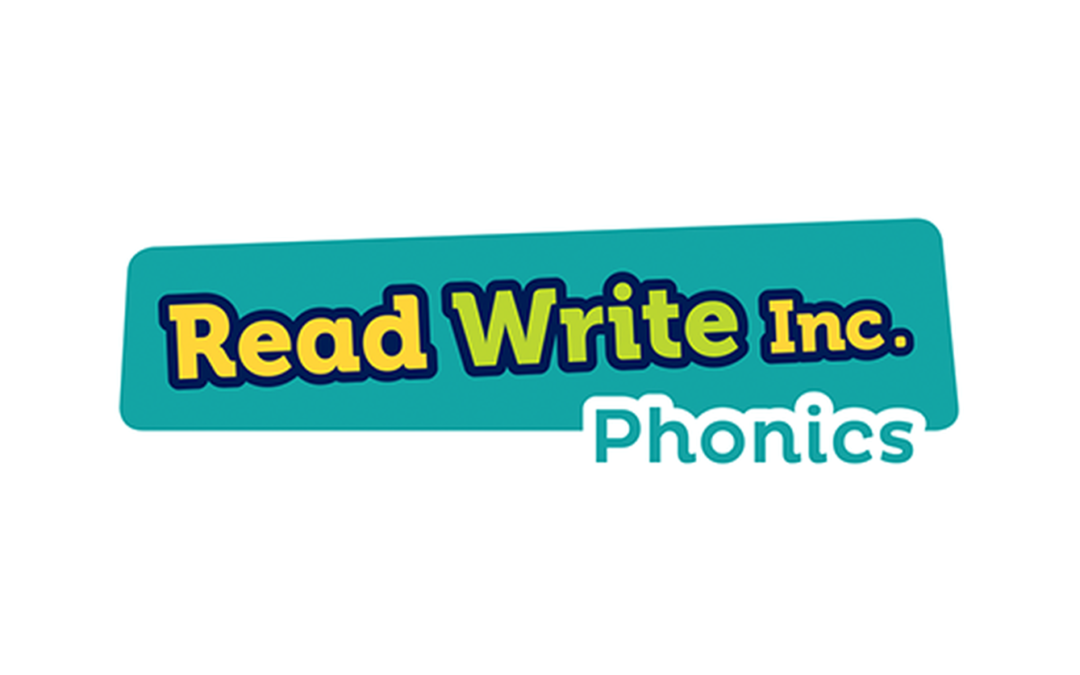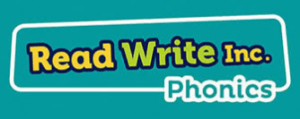We begin the process of learning to read in the Early Years Foundation Stage with daily systematic, high quality phonics teaching. We teach our children to read using a consistent approach throughout EYFS, KS1 and beyond.
Synthetic phonics refers to an approach to the teaching of reading in which the phonemes [sounds] associated with particular graphemes [letters] are pronounced in isolation and blended together (synthesised). For example, children are taught to take a single-syllable word such as cat apart into its three letters, pronounce a phoneme for each letter in turn, and blend the phonemes together to form a word. Synthetic phonics for writing reverses the sequence: children are taught to say the word they wish to write, segment it into its phonemes and say them in turn, for example d-o-g, and write a grapheme for each phoneme in turn to produce the written word, dog.

Fidelity to fluency
We follow the one of the DfE validated phonics schemes: Read, Write, Inc. Phonics scheme with fidelity. We have an expectation that all pupils will meet the minimum half-termly expectations of progress from Reception to Year 2 unless they have recently arrived or have significant SEND. All pupils who are learning to read receive direct teaching of RWI Phonics, reading and writing for 1 hour and 15 minutes every day (and up to 45 minutes in Reception by Term 3). Once children have completed the Phonics programme to the end of Grey Storybooks, they will begin RWI Comprehension in Year 2. It is our expectation that the vast majority of children will be fluent readers before the end of Year 2 and will no longer need explicit phonics teaching for reading.
Reading teachers have the necessary resources to teach RWI which includes the RWI online portal, handbooks, sound charts, sound and word cards, Oxford Owl online resources, RWI core storybooks, book bag books and Get Writing books. Teachers avoid using unrelated resources and activities.
Pupils are taught to follow clear expectations for partner, class and group discussion including:
- Listening behaviours – team stop signal and my turn, your turn (MTYT)
- Routines for talking to a partner (TTYP)
- Feedback routines
Pupils are helped to articulate their ideas and thoughts in well-informed sentences by:
- Building sentences orally and rephrasing what they say
- Teaching new vocabulary before a given activity
Reception – Making a strong start
When children enter Reception in September, they begin phonics lessons lasting 20 minutes which includes reading and some writing. By the end of term 3 this will be up to 45 minutes. Pupils who fall behind are identified by the third week in Reception and receive extra practice in speedy reading of letter-sound correspondences, oral sound-blending and/or word reading. Teachers organise frequent ‘Fred Talk’ and ‘Pinny Time’ practice sessions with whole class or groups of children throughout the week.
Expertise in teaching of early reading
All teachers and teaching assistants are fully trained to teach reading and writing using Read, Write Inc. Our Reading Leader, Mairead, is supported by our Deputy Headteacher, Ross, and has the time to fulfil her role.
Our Reading Leader receives termly coaching from a Ruth Miskin Trainer as part of our development days. The Reading Leader ensures that reading teachers are able to practice regularly and coaches reading teachers (who need extra support) during RWI lessons.
Decodable reading books
Read, Write Inc storybooks are organised in the given sequence and are not matched with other reading schemes. We show fidelity to the scheme and although children are able to take home a fiction or non-fiction book from their class book corner or library to share and enjoy with an adult at home, when learning to read, pupils are not asked to read books that require them to guess words or deduce meaning from pictures, grammar or context clues, or taught using whole word recognition.
Pupils re-read core storybooks at school and at home to build fluency. Pupils also read RWI book bag books at home which are carefully matched to the sequence they are following.
Our pupils continue to follow RWI until they have read all blue and grey storybooks. Once they have done so, they will be able to read familiar words speedily and decode unfamiliar words confidently.
Progress
We know that the best way for children to make progress is to have high-quality and daily phonics teaching by an expert reading teacher. Through continued professional development for our reading teachers, we ensure that RWI lessons are of the highest standard to reduce the number of pupils who need extra support.
Teaches pay particular attention to ‘Spotlight’ pupils who are in danger of falling behind during RWI lessons. Teachers work hard to ensure that all pupils meet the minimum half-termly expectations of progress from Reception to Year 2. Pupils who arrive to our school in Year 3 or Year 4 who are not meeting Year 2 expectations, learn to read using RWI phonics; those in Year 5 or Year 6 use the RWI Fresh Start Programme.
Our Reading Leader, and Deputy Headteacher, assess pupils’ letter-sound knowledge and word reading every half term and pupils are then grouped homogeneously. The assessments used help to identify pupils who are falling behind and one-to-one tutoring is organised to these pupils. In fortnightly pupil progress meetings, children who are not making the expected progress or who are behind in their learning are discussed and actions are put in place to ensure they catch up.
In order to maximise the progress that children in Year 1 make, short afternoon speed sounds are delivered to the whole class.
Leadership
Our Reading Leader ensures the intent, implementation and impact of our phonics programme. She works skillfully with reading teachers in order to ensure they continue to deliver high-quality phonics sessions each day.
The Senior Leadership Team works alongside the Reading Leader to ensure that RWI is implemented fully to ensure that all pupils learn to read. Senior leaders are committed to supporting teachers to enable them to make this happen. Due to the schools commitment to reading, over time, the vast majority of pupils meet the standard of the Year 1 phonics screening check. Pupils with SEND who have not met the standard of the check make good progress in learning to read from their individual starting points.
Further information for parents
More information on Read, Write, Inc. Phonics for parents can be found on the parent introduction video and the parent leaflets below.


